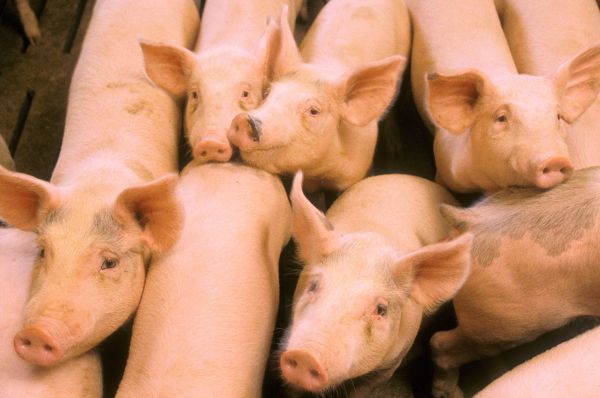CFIA to continue PEDv hog trailer policy until May
By Staff
| 3 min read

(Regis Lefebure photo courtesy ARS/USDA)
Emergency federal protocols that have allowed empty hog trucks coming into Manitoba from the U.S. to be cleaned and disinfected on the Manitoba side of the border will now continue until May.
In a producer newsletter Thursday, Manitoba Pork chair George Matheson said the Canadian Food Inspection Agency, which had previously planned to end the emergency protocol effective Jan. 13, 2016, has now agreed to extend that period until May 2.
Fearing transmission of the porcine epidemic diarrhea virus (PEDv), Manitoba Pork, the Canadian Pork Council and other provincial hog industry groups have “strongly objected” to CFIA’s plans to return to full enforcement of previous hog trailer regulations at the Canada/U.S. border, Matheson said.
Without the emergency protocol in place, empty hog trailers returning to Canada after delivering hogs in the U.S. would have to be cleaned and disinfected at U.S. facilities before being allowed to enter Canada.
Manitoba Pork officials have previously noted U.S. highways used by livestock truckers have few such truck washes, and the ones en route have poor water quality and lower standards for cleaning and disinfection.
Under the emergency protocol, CFIA has allowed those trucks to be sealed in the U.S. and disinfected once in Manitoba. Federal Border Services officials have been tagging empty livestock trailers and submitting the tag numbers to the CFIA.
Tagged trailers would then go to a certified wash station in Canada and be washed and disinfected as per Canadian Swine Health Board standards.
“This had worked relatively well for the last 18 months,” Manitoba Pork general manager Andrew Dickson said on a recent telephone town hall with Alberta Pork. “You can see from the number of cases that we got in Manitoba, that we had relatively few cases compared to other parts of Canada and compared to the U.S.”
However, CFIA said in a memo to truckers last fall it had “reviewed the situation and has concluded that the outbreak of PED in Canada no longer merits an emergency response.”
The agency had planned to run an “informed compliance” period ending Jan. 13, 2016, after which the emergency protocol would be fully lifted and any vehicles not first cleaned in the U.S. would be denied entry into Canada.
However, Matheson said in Thursday’s notice, CFIA has now “committed to discussing the regulation and its shortcomings” at an upcoming federal/provincial ag ministers’ meeting in mid-January, then to undertake a review of the regulation.
Canada hadn’t seen a new case of PED on a hog farm in over four months, up until a new case was detected Dec. 2 on a finisher operation in southern Ontario’s Lambton County.
PED positive environmental samples were also recently identified at three assembly yards in Manitoba. However, the five Manitoba farms previously confirmed with PED have all been ruled “presumptive negative” for PED as of Nov. 27.
That said, with winter now officially here, cold conditions mean PED transmission is again more likely in Canada.
Alberta provincial veterinary epidemiologist Dr. Julia Keenliside warned recently on the industry program Farmscape that in the U.S., the main source of the PED virus for Canadian herds, the disease remains established or endemic.
Thus, she said, “we have to remember that it’s going to be there for quite a long time and still provide a risk for Canada.” –– AGCanada.com Network


